
Unbelievable in all the worst ways
Unbelievable crap. The start of it is bad enough. The usual Japanese penchant for men forcing themselves on women and then backing off so that they can be portrayed as caring and considerate. This is the very first scene, so no spoilers here. But then later it's so clear that the writer has zero experience of how a clinic would operate in the circumstances of the plot. Not reporting to the police? Work procedures and regulations anyone? If you have even an ounce of professional work experience this will be so ridiculous as to be unwatchable. Let alone the childish and annoying ML and the token weird characters. I struggled through to Episode 7, before finally drowning in incredulity.Was this review helpful to you?

Muted, poetic, thoughtful
Although it is a Korean drama it has all the hallmarks of a Japanese production. The sombre moodiness and the underplayed emotion. The observation of thoughtful faces in a muted colour palette. The poetic rather than the pragmatic approach softens the tone so that it sits comfortably in melancholy. Any raw emotion is smoothed out by gentle music and there is no wailing going on. The OST was good, setting the tone for the drama.There is a thoughtful progression to the feelings that work their way through right to the end which has a gentle landing. It delivers what it promises in the title, “What Comes After Love” so don’t come into this thinking it’s a standard romance. The messages in the show resonated with me, and reflect the changing perspective of what love and relationship are/should be as we grow older. It is the journey the protagonists take as they learn to appreciate who they are and what is needed to sustain themselves and a relationship.
Overall the show is solid with good performances, believable chemistry and consistent quality in the production values. Although I enjoyed it very much, there was not that spark to lift it to something special. There were no new insights for me and the story played out in a safe and somewhat predictable way, taking no risks. Where it did do very well was to show the progression of emotions. The rating reflects the quality of the production overall, rather than the originality, which would have scored lower.
Was this review helpful to you?
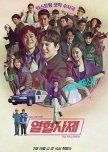
When it was good it was very very good, when it was bad ...
A mortal sin for any writer is to undermine the credibility of their characters. But that becomes a cardinal sin when they do it just to try and raise a cheap laugh or serve the demands of the plot. There was so much to like about Fiery Priest and also Vincenzo (same writer), but in the end I couldn’t finish Vincenzo because I refused to watch a great character destroyed by its creator in collaboration with the director and I struggled with Fiery Priest.In both dramas, the problem really kicked in for me about a third of the way through, when the stakes become increasingly serious. I felt that early in the drama, I had been invited to believe that Kim Hae Il was a bona fide professional, operating in a world where ruthlessness and violence are central. But a little later on, he repeatedly behaved like an amateur, and a stupid amateur at that. This attempt to marry comedy with hard core action failed because the comedy felt forced at the expense of both credibility and (worse) character integrity. The result was to destroy my connection to the main character and leave me confused about how to view him. Instead of being the cool dude that many characters in the drama thought he was, in key scenes, Kim Hae Il was presented to the viewer as an incompetent idiot to be laughed at, not with. To be honest, I was so pissed early on with the writer and director for spoiling what had the potential to be a really good drama that I nearly stopped watching.
But not being someone who wants to give up easily, I found there was enough merit in the cast to keep me going. Around two thirds of the way through, the drama had been reduced to farce. And yes, it is very funny. So I just gave up and went with the flow and enjoyed the comedy and suspended my disbelief when things got serious and his character flipped. However, Kim Hae Il is simply not credible as any sort of cohesive character and I think it would have been much better if I had never been asked to take him seriously. I felt that Kim Nam Gil was as confused about the character as I was, but did his best to convince me.
If you are prepared for your hero to exhibit multiple, contradictory personalities, encompassing super cool action hero, ruthless killer, sexy priest, tortured soul, fluffy bunny, goofy adolescent, angry man, and a totally cringeworthy imitation of Johnny English, then this is absolutely a good drama for you. As many before me have said, it offers up in spades in so many other departments, with some wonderful performances, great characters and inventive fight choreography. A shout out to Lee Ha Nee and Go Jun, who were exceptionally good.
What my rating means: 7+ A watchable drama, but nothing exceptional. Good enough to qualify for the race, but finished with the pack. The sort of thing that promises more than it delivers.
Was this review helpful to you?

A good example of what Korean drama does best
I have read comments that criticise the Korean content on Netflix for being “too western”, as though pure Korean drama has been corrupted and led astray. I really don’t see it like that. Rather I think that Korean writers, directors and actors have been given a less restricting space to work in. Where the target audience is broader than the domestic weekly TV watchers, the train tracks of trope, cliché and accepted practice are still under construction, and the censors (real and ideological) don’t cast so long a shadow.This drama feels very much like that. It retains all the hallmarks of what Korean drama does best: slow pacing; subtlety and character exploration, which are, in my opinion, so often sadly under-developed in US drama. But it allows an added edge of imperfection that is, for me, the missing ingredient in many home-based Korean productions. As though the perfect idol make up has been removed to reveal a natural imperfect beauty. The characters are still well within the social bounds of respectable, but they have an underbelly beneath the shiny exterior that gets exposed. They are being permitted to fail in terms of perfection and be acceptable, and accepted, as ordinary. The SML, Si Jun, is even allowed to be morose and negative for almost the whole drama without it dragging the whole thing down.
The dominant theme of the drama is hiding and its relationship to honesty, both with ourselves and others. The masks we put on, not just to hide ourselves from the world but also to hide ourselves from ourselves. The oblivious hiding, where we do it so well that we can’t even see what we are hiding. And the hiding of the truth about others, wanting to believe what someone is presenting to you, rather than diving with them into the murky depths of their world. Hiding our own fears and insecurities under the pretext of something else, such as not wanting to invade someone’s privacy. The drama addresses all these types of hiding. The plot explores what it takes to reach those moments of honesty that realign the characters with the world around them and free them from the shackles of the past allowing them to accept the broader truth.
The narrative flow was a little lumpy, especially in the latter part. With the result that it was as though they needed to explain, rather than everything already being in place for the viewer to understand. A more integrated approach to the backstory earlier on, for the second couple, would have made this less clumsy and allowed for a better lead into the final episode.
The cinematography was clean and square. Presenting pictures in which the action unfolded, rather than wondering through the set: static rather than fluid. There was a crispiness to the overall mood, with the use of sharp contrasts and pure colours.
For a drama where the soundtrack was featured, it didn’t really impress me. Using well worn melodic styles, heavy with the sort of filler piano runs that trickle along like relaxing background noise in a respectable bar. And the songs, although pleasant were not groundbreaking or striking in any way. I think an opportunity was missed there.
Overall I really enjoyed this drama. The production was solid rather than remarkable. Its main strength was to offer good characterisations and explore the depth of them well.
Was this review helpful to you?

Just a little too bland to be thought provoking.
This slice of life film explores the nature of social connections and the difference between aloneness and loneliness. The protagonist, Chihiro, understands how to make attachments and bring people together, but ultimately shies away from the community she enables. Everyone is trying to escape from something and is brought into connection through her, but what else connects them is questionable. Even in the midst of people, Chihiro experiences her separateness and alienation.It is well observed but not beautifully observed. I didn’t find the insight I was looking for here. Perhaps it was the sanitised personalities of the characters, many of whom had lived difficult lives but didn’t seem to have the resultant rough edges. They didn’t come across as affected or moulded by their experiences, just as mild people unable to find an acceptable social place. We are all moulded by our experiences and this film felt afraid to show that just in case the characters might turn unsympathetic. Chihiro has experienced tough times as a child and young woman, but how or whether that has contributed to her emotional distance, or is perhaps just her personality is never fully explored.
It is the sort of film that asks questions, but doesn’t offer too many answers, which is fine as long as the questions reveal some new perspective or path to travel. For me, that wasn’t really the case.
Was this review helpful to you?

A wonderful unfolding of layered characters.
I’m wrapped up in a comfort blanket eating too much 70% chocolate, a surfeit of endorphins and caffeine. Netflix has offered two outstanding slice of life dramas and aired them simultaneously. First, “My Liberation Notes” and now “Our Blues”. What more could be asked for? Whereas “My Liberation Notes” was essentially a story built around family, “Our Blues” centres around the members of a community and explores their individual lives and circumstances. Given the title, there is a hint that this drama will tackle the things in life that are difficult. But far from being sad it ultimately strikes an uplifting note.The stories on offer are not about huge life changing tragedy but the emotional hurdles that life puts up for us to jump over and the hoops we go through. Essentially this is a drama about the good heart that lies at the centre of ordinary human beings. Their generosity, warmth, caring and insecurities.
They are stories set within a community where there is no real privacy and no anonymity. Where caring and interference exist either side of a blurred boundary which is crossed and crossed again. They are essentially about the price individuals are wiling to pay for deeper connection and love, and the confused and contradictory emotions that are experienced when that love and resentment collide.
There is no judgement written into the narrative. Each character has depth, we can love them from one angle and criticise them from another.
Among a slew of excellent performances Lee Byung Hun as Lee Dong Seok was the standout. Even though the writing for the last three episodes concerning his relationship with his mother, did not work as well for me, his performance did not falter.
Next in line was Han Ji Min, who was painfully convincing as the conflicted and hurting Lee Young Ok. Also, Lee Jung Eun as Jung Eun Hee, the stalwart glue of the community. But to be honest there was barely a weak performance in a large cast. Perhaps Shin Min Ah failed to completely convince me as Min Seon Ah, but she came good in the end.
This is the sixth writer (Noh Hee Kyung) /director (KimKyu Tae) collaboration which started in 2008. They include “Live”, “That Winter, The Wind Blows” and “It’s Okay That’s Love”. The long experience of working together brings a sense of seamless harmony and easy expression to the end result. In a drama of so many parts there can sometimes be an unevenness of tone, but here the actors were helped to bring a consistent feel that unified the whole production.
One of the most challenging things to write is the slow unfolding of emotions for a character. Peeling back the disparate layers to find out what is underneath. To reveal the unexpected, that often surprises us. This writer has done a magnificent job of just that, particularly with the story of the twin sisters which explores deeply complex and conflicting emotions and reveals them beautifully.
The cinematography is simple and what I loved about this show was the relief from artificially beautified faces. People were shown in their ordinariness with limited makeup and occasionally, deliberately unflattering lighting. In terms of camerawork, it was Jeju Island itself that became the star of the show with all its natural beauty on display.
The music was a weak point for me, with too much use of hotel-lobby style background music that failed to do justice to the emotional depth of the action. Thankfully, there were times when silence carried the pathos and did justice to the acting.
This drama comes highly recommended.
What my rating means: 8+ A great drama with interesting content and good writing, direction, acting, OST, cinematography. But didn’t quite have the requisite sparkle to bump it into my all-time fave list. Worth watching.
Was this review helpful to you?
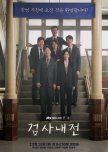
An undiscovered treasure.
This drama is wonderfully unique and the only other drama I can think of to compare it with is “Misaeng”; but set in the public service rather than the corporate world. It begins as a quintessential comedy of manners; beautifully observed and very funny. There is no slapstick, forced humour or conscious jokes it is all situational comedy requiring an appreciation of what-is-not-said from the viewer. The smile hardly left my face for the first 5 episodes and I often had to stop streaming because I was laughing too much to read the subs.This is the type of drama that someone who has worked for a while can really appreciate. The office politics are just wonderful and understanding them is 50% of the humour. If you have worked in a setting that interfaces with the public, or community/social work, then the scenarios in this drama will be delightfully reminiscent of how reality can often be more absurd than fiction. The storyline was taken from a book by a rural prosecutor about his experiences and it has retained a very firm grip on reality.
The skilled and acute observation of the writer, the subtle portrayals by the actors and the understated direction tell a very human story, on one side of fraught repressed emotions, petty rivalries, oneupmanship, self delusion, bullying, jealousy and misjudgement; and on the other side, of compassion, dignity, forgiveness, generosity, loyalty, friendship and support.
The story features the relationships and strategies that most people adopt in order to make life easy enough to bear and is mostly about people for whom climbing the ladder is not the most important thing in their life. They just want to keep their heads down, ensure that their salaries drop into their bank accounts every month, and do enough of a good job to keep themselves from being noticed. But underneath there lies a streak of obstinate courage.
The drama starts with everyone just muddling along in comfortable complacency when the supercharged tornado of Cha Myeong Joo breezes in from Seoul to shake up their world. Ambitious, arrogant, abrasive, smug and beautifully played by Jung Ryeo Won, she divides opinion but completely rubs Lee Sun Woong up the wrong way. He is brilliantly portrayed by Lee Sun Kyun and is the notional protagonist. Over the course of the sixteen episodes, through various scenarios of conflict, competition and grudging co-operation, we see the heart that lies beneath the surface of both of these characters. Essentially though, this is an ensemble piece and all of the leads are praiseworthy with no weak links. Each one has their own story and is featured at some point in the show.
The drama presents a variety of case scenarios, sometimes using the lives of the main characters. They vary from the truly tragic to the totally ridiculous and the action can switch from comedy to pathos in a heartbeat. The vein of social commentary that lies underneath brings a serious and compassionate note to the drama adding another layer of richness. As with most Kdramas, corruption rears its head and the resultant cost to everyone is movingly revealed.
The production values on this show are pretty standard and the music is upbeat in the main, borrowing some latin-style rhythms. What sets it apart is a fabulous script and some really top notch performances.
As the show is episodic in nature there is no need to binge it. On the contrary, it is something to be savoured. It has short plot lines that can be munched through a couple of episodes at a time. So curl up on the sofa with your favourite tipple and enjoy the feast along with the cast who eat their way through a mountain of food. A perfect show for a Sunday night.
I was really surprised at the low viewing figures and the lack of reviews in English for this show on MDL. I totally fell in love with it and have rated it really highly for its entertainment value and delicious humour. If you are finding it hard to find, then on VIKI at least, search for it under the title “War of Prosecutors”. It comes highly recommended.
What my rating means: 9+ A drama I totally fell in love with and is endlessly re-watchable. It ticked all the boxes and had some serious wow factor. It would go on my personally recommended list.
Was this review helpful to you?

Underrated and undervalued
I wanted to write a review for this drama because I think it is vastly underrated. Reading the comments it was clear that the toxic elements in the main relationship were a serious problem for a lot of people. As far as I’m concerned, showing toxic relationships is not a problem as long as the consequences are also honestly shown. And for me, this drama does that. There is a beautiful moment of show-not-tell in the very last scene which I will write at at the bottom as a spoiler. And that moment spoke volumes to me.I thought it a beautifully insightful show about the types of relationships that happen in your inexperienced early twenties, when you are trying to live the fantasy of your adolescence and start to realise that a great deal more is required of you than you had expected. That however much you assumed it was going to be possible, you can’t have your cake and eat it too. Love it seems, is not some magical thing that waves its wand over you and suddenly Cinderella is dressed for the ball. Excitement is not the only necessary ingredient or even the main ingredient. Trust, not manipulation, must be there and that is something that you need to work out how to build and then maintain.
Song Kang did a masterful job as the fb Park Jae Eon. So good in fact that there were many times I just wanted to slap him (metaphorically speaking). His character’s arc is about reliance on sex as the answer to all problems and what it takes for him to realise it is not the only answer and sometimes absolutely the wrong answer. A criticism would be that not enough time was spent on Park Jae Eon. His character transitions were there, but I could have done with a little more help, especially towards the end, in recognising them and understanding them. Time could have been stolen for it by omitting the somewhat bland relationship taking place in the office. As a viewer you need to work a bit, don’t just notice Jae Eon’s jealousy or his domesticity, but realise what those things mean.
Similarly, Han So Hee was also very good as the conflicted and self-doubting Yoo Na Bi. Again her reasoning was not always explicitly stated but hinted at all the time. Of the leads, only Chae Jong Heop as Yang Do Hyuk had a straightforward role which was because there was no significant character development. He played the nice guy nicely, what more can be said. It was not a demanding role. There was lots to like in the relationships of the supporting characters, which looked at different hurdles to be crossed in the relationship game. In particular Lee Ho Jung as Yoon Sol stood out.
This drama is not a romance about getting love right and living happily ever after. It’s about getting love wrong. It invites the viewer to observe the mess that we make of things with each other and what might be required to muddle along in a better way.
It is a good script, with credible dialogue, brought convincingly to life by an able female director and good actors. It showcased some great artworks (Na Bi’s sculpture at the end was stunning) and some beautiful cinematography. And for once, because it was a Netflix original, the sex scenes were realistic and believable.
This drama does not lay it all out for you, but requires your attention to detail and some thought. To really get the most from it I would recommend that you watch it twice (it’s only 10 episodes long, so not too onerous to do that) and track the development the second time round. You will see and understand much more once you know where it’s headed. If you are prepared to put in a little effort, it will not disappoint.
Spoiler ahead…
Spoiler ahead…
In the last scene, Na Bi almost drops Jae Eon’s hand when she sees Do Hyuk in a cafe with another girl. The look of naked panic and vulnerability on Song Kang’s face is what spoke volumes to me. Na Bi will leave Jae Eon behind quite quickly and he knows it. It is not Na Bi who will be hurt by this relationship. On the contrary she will gain confidence. He is the one who will be licking his wounds. I just hope to any sort of god that he doesn’t go to Paris with her, that would be just too painful!
What my rating means: 8+ A great drama with interesting content and good writing, direction, acting, OST, cinematography. But didn’t quite have the requisite sparkle to bump it into my all-time fave list. Worth watching.
Was this review helpful to you?
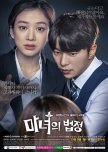
Been there, seen it, done it all before... and better
There’s a strange contradiction in the first part of this drama. It centres around sexual abuse and the trauma caused by it, but signally fails to reflect the distress caused from nasty situations created by the plot. In similar situations of threat and vulnerability, the abuse victims experience fear and trauma, whereas the lead characters treat it almost as a joke, particularly Ma Yi Deum, and walk away unmarked. If the viewer accepts the experience of the lead characters, which is technically where their allegiance should lie, then their only option is to belittle the experience of the “victim” characters. It is an uncomfortable marriage of the serious and the trivial, of drama and romance tropes which initially made uncomfortable viewing for me.I’m not sure what the intention was, to lighten up a heavy topic or to show the character Ma Yi Deum in an unfavourable light so that character development was more pronounced, perhaps. If so, it did itself no favours and the overall impression was that abuse is something that a determined personality can sail through without being seriously affected. Dream on.
Having said that, the tone of the drama changed towards the mid section and I found it easier to warm to the character Ma Yi Deum. Jung Ryeo Wan did a great job and I found her convincing in the part and wonder if this was why she was chosen for “Diary of a Prosecutor/War of Prosecutors”, where she also did a great job in a far superior drama.
Heo Sung Tae as Baek Sang Ho is good in this, and when you look at his filmography you can see he knows how to pick a good drama. He’s an actor that doesn’t bask in the limelight but always turns in a good performance. He completely out-acted Joon Kang Ryul in every scene where they were together. Joon had three facial expressions and thoroughly worked them all into overtime.
The other actors got the job done and to be honest there was little to be explored in the mundane script.
Once the main theme of the drama kicked in it changed into fairly standard thriller in terms of the plot which was predictable and clunky. However there is one moment of ridiculous plotting which defies all credibility and other stupid moments that pissed me off and in the end I just got too bored and gave up. There’s only so many times you can watch this plot when there is nothing original or really engaging in the production to keep you going.
What my rating means: 7+ A watchable drama, but nothing exceptional. Good enough to qualify for the race, but finished with the pack. The sort of thing that promises more than it delivers.
Was this review helpful to you?

The beating heart couldn’t save the mutilated body.
The concepts are good and the soil so fertile that a really engaging drama could easily have been written. In the first eight and last three episodes there is enough plot to fill four series, but unfortunately we have the seven-year old child style of storytelling: he did this, then she did that, then they got angry, then everyone fought, then they got married etc etc. The events flash by so fast that we just skim the surface.What’s the cost of rushing through things? Opportunity for characterisation is very limited. We don’t see the internal struggle to reach a place of action. All we have is a character telling us how they feel and what they are going to do next. There is no time to “show” what is happening inside, instead we have to be “told”. This engages the wrong part of us, head instead of heart. Nobody likes to be “told” what to feel, hence my initial indifference to the characters and a really strong temptation to give up.
What was done very well however, came when the narrative settled into a more court based story. The enemies to lovers trope was the beating heart of the drama and very well executed. Time was taken to step through the stages of the changing relationship and both Liu Yu Ning and Song Zu Er did a convincing job. It was obvious that romance was the outstanding skill of the writer. If you primarily watch dramas for character driven romance then this is a good one and it perhaps accounts for the, imo, overblown rating on MDL. But as far as I’m concerned, one swallow does not make a summer, and the rest of it was flawed and painfully naive.
The world building was particularly underwhelming. There were too many countries with an excess of characters and not enough difference to distinguish between them. The social norms and cultural flavours seemed to be the same everywhere. Court etiquette and societal structure was not well thought through, leading to a strange mix of casual and formal. Visiting dignitaries arrived and departed without troops and advisors in tow and people rode off into the sunset with no baggage or protection. Add to that, unsophisticated court intrigue, laughable international relations and sadly lacking military strategy and you basically have an unconvincing drama. They finally managed to ramp up the tension sufficiently in the last few episodes but by that time it was far too late, far too much and tbh the budget really didn’t meet the need.
The editing in the first third of the drama, and final episodes seemed to have caught the same infection as the plot. It was clipped and choppy and it felt like being caught in cross currents. In the middle section the production values improved and there was some attractive costuming and sets.
Having just come from the “Joy of Life” series, this drama suffered from the comparison. Too often it reflected the weaknesses of the writer and failed to create a tight and compelling world.
Was this review helpful to you?
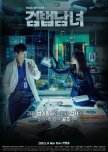
Bad copy of bad originals
You can clearly see the American influence in this production and to be honest it doesn’t sit well. This is the Korean version of CSI/NCIS and it has all the same weaknesses as the originals. Instead of the more usual focus on the machinations of internal politics, the slow unfolding of a crime, the in-depth character interactions (imo the strengths of Korean crime dramas), we have a series of crimes dealt with in one or two episodes and some two dimensional characters whose personalities have been clearly modelled on the American versions. Everything skims along the surface, with no depth and no character deviation or development.Crimes are solved in superficial and ridiculous ways in double quick-time and there’s a load of spurious criminal psychology. The convenient plot devices stack up and all credibility is trampled. The young female prosecutor seems to have inordinate amounts of time to hang around watching autopsies and never has to do anything boring like sit at her desk and work. She has a penchant for doing stupid things that get her into life-threatening situations from which she always miraculously escapes. Horrendous experiences abound with zero effect on characters who bounce back to what they were in as much time as it takes to run to the next scene. And just to increase the air of unreality, the director requires the actors to really ham it up…
If you like the style of CSI then you’ll probably like this. Personally I think it’s a really bad imitation of a bad American original.
What my rating means: 1 - 3+ Totally unbearable, but often compulsively watchable as you really can’t believe that it can be this bad.
Was this review helpful to you?
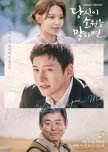
The show didn’t deserve the quality of its actors
I write my reviews as I watch a show and often most of it is written by episode 8 and I tweak it where necessary as I finish watching. So I wrote something for this show, then found that I was watching a totally different drama in the second half.The start of the show is a touchy-feel of romance, a pinch of mystery, a spoonful of trauma, a litre of tears and absolutely no spice. Mix all ingredients in the bowl and bake for 8 long hours to create a MacDonalds style bun - bland and inflated with not a lot of substance and awash with OTT sentimentality.
Then, about two thirds of the way through it changes completely. I could see the plot twist coming from four episodes previously and was thinking, please don’t go down that route, that’s just way too obvious and cliché. But it ignored my advice and blundered on with a totally predictable and off the wall plot involving a complete psycho with murder, mayhem, memory loss and every other cliche in the book.
Then in the last couple of episodes it found a balance and ended on its best effort.
But somehow through all of that it was watchable and what made it so was the acting. This show really does not deserve its leads. Ji Chang Wook and Choi Soo Young put in really good performances that were way better than the sentimental script and ridiculous plot deserved. They have very believable chemistry, but Ji Chang Wook always manages to have good chemistry and being such a likeable person in RL I’m sure he makes it very easy for actresses to be relaxed around him.
Not only them but the raft of experienced supporting actors really kept it afloat when it was in danger of going under. Especially Nam Tae Hoon (Jang Seok Joon) who put in a sensitive, believable and moving performance. According to his bio on MDL he has only had very small parts in the past, let’s hope this launches his career and he gets better parts in the future.
I criticise thrillers for not doing the psychology right, so now I’m going to do it here because this one really bugged me.
Censorship and taste are strange bedfellows. You can have as much gory, vicious, annihilating, sick and twisted violence as you like, but whatever you do, don’t show the real impact of the trauma which violence begets. And in the first half of this show we had another sanitised version. The sentimentalisation can be just as sick as the gory violence. It pretends that a sickly smile and a nicey-nicey attitude can paper over all woes, and healing from them just needs someone “nice” to smile at you so you can learn how to behave “nicely” in public. I really wish it was that easy…
OK rant over.
So this one is a mixed bag and I’m finding it difficult to know how to remember it and rate it. I think I’m just going to have to give the credit to the actors for pulling it off.
What my rating means: 7+ A watchable drama, but nothing exceptional. Good enough to qualify for the race, but finished with the pack. The sort of thing that promises more than it delivers.
Was this review helpful to you?

And as if by magic....
I could really rip into this on a number of counts, but I think that would be unfair. Because, on its own terms and in its own genre, it’s quite good and sometimes really good. I try to resist the temptation to criticise something for what it never set out to be, and this one is clearly teenage fantasy land as far as romance and politics goes. Therefore to ask it to be sophisticated is not fair. There is a naivety about it that can get quite eye-rolling, particularly as far as the politics goes. But unlike, for instance, Alchemy of Souls, it is well directed with some good performances that help to carry you through the credibility gaps. But unfortunately there are quite a few of those…But first the good bits. Apart from the CGI, which I’ll get to later, I loved the colour palette for the series. It was rich and saturated and provided a sumptuous backdrop for the action. This was supported by dynamic camera work that helped to focus in on the action.
Having been adapted from a book, there had been some thought put into the formation of the characters which were varied. Because of this, I was never in doubt as to who was who. In general the cast stepped up and delivered, managing to lift an at times banal and clumsy script. You know it’s not good when during the climax you are explaining backstory and the tension plummets. The ultimate villain of the piece however, was fairly cringey. The character was a good idea and Yu Cheng En tried his best, but I don’t think it will be one for his CV. The writing didn’t help him, it was laboured and repetitive. Such a character is hard to get right.
The lovers delivered in spades and there were plenty of opportunities for romantic and playful interaction. I suspect this is the basis for the high rating and if romance is your primary interest, then this is definitely worth a watch. I agree with PeachBlossomGoddess, Hou Ming Hao being drop dead gorgeous doesn’t do any harm and easily papers over any deficiencies in his acting. Lu Yu Xiao melted nicely into his arms and wasn’t too pouty petulant either. There was both chemistry and affection aplenty.
The pacing for the first thirty episodes was very good. It skipped along at a pace that managed to leap across the yawning chasms of the plot holes, giving you no time to reflect on how you nearly crashed and drowned. Unfortunately the last six episodes didn’t make it, more about that in a minute.
Now for the negatives… The basic idea was sound, but the execution of it was sadly lacking. The fantasy magic was an all purpose anti-biotic which cleared up every sort of woe. Just point your fingers and mumble some words that preferably include heart and array, throw in some agonising pain, then without exception it all gets cured. All sorts of previously unheard of miraculous spells and occurrences leap in to quickly dispense with a dilemma. It’s a sign of a badly thought through world building exercise. If the scriptwriter has no concept of how things should work and what the limitations are, then how can the audience invest credibility into it. Yes, it isn’t real, it isn’t possible, it’s fantasy, but, that doesn’t mean that the imaginative element should not have structure and reasoning behind it, rather than just be a convenient way to solve plot problems.
Those last six disastrous episodes… As I said it rips along perfectly well until that is you get to the big plot twist around episode 30. Which instead of landing with a bang, sort of flopped into existence and everything after that just fell apart and underwhelmed. There was too much plot to be adequately explained for the time available and as a consequence the chasms started swallowing chunks of storyline, so that all that was left was random happenings desperately straining to hold onto one other.
But the main reason it didn’t come up to expectations can only be laid at the door of the budget. The CGI and fight sequences were bad. Sorry but there’s no other word for it. The CGI for the qi was very basic and not well integrated into the image. It had a sameness to it that became predictable and unconvincing. The green screens were often lurid instead of subtle, with a colour palette totally out of synch with the overall feel. In a story about warriors, there is naturally an expectation of at least some decent fights. But even the finale followed the same limited point and shoot style and was so easily solved that it made a nonsense of the whole build up beforehand. As for the spinning parasols, I must admit I couldn’t suppress the laughter, you’d think that auto-twirl would have been built into the design, but obviously the props budget couldn’t stretch that far.
This one is for the romance junkies who can overlook its glaring faults.
Was this review helpful to you?
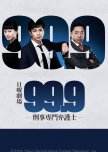
An eye-opening intro to the Japanese legal system
As a law show this is not particularly good, but as a critique and indictment of the Japanese legal system, it's a total eye-opener. All the procedural stuff that fills "Western" crime and legal dramas seems to be missing from the Japanese system, hence the somewhat naive approach. Admittedly this drama is almost ten years old, so may not reflect the current situation, but I doubt that much change will have happened in those intervening years. Let's just say, I wouldn't want to be arrested in Japan...Was this review helpful to you?

A mix of really good and confusingly bad.
This was a difficult to rate drama, because it was both impressively good and also confusingly bad. I would divide it into first two thirds good, last third missed the mark. What really worked in this drama were the central characters and their relationships. Throughout the scenes which were set outside Tanqi, there was a compelling story which involved the building of their relationships. It was the heart of the drama and provided an anchor for the whole narrative.As a viewer I needed this anchor because the raft of characters that were introduced was extremely confusing. I found that I could just about keep up with which sect they belonged to, and the costuming helped here, but really lost it at times in terms of who was allied to whom and the history of the various characters’ interactions. As a result, I felt like I was tossed on the waves and in danger of drowning some of the time.
However, when the focus of the story moved to Tanqi, about two thirds through, the anchor was also set adrift. The intrigue plot simply felt like it got out of hand and was a force on its own, dragging the writer and the characters along with it. Somewhat like the effect of too much power in the hands of someone not big enough to contain it. The interactions between the main characters were disrupted and their appearances seemed to be reduced to matters of convenience, destroying the strength of the drama in the process. In fact one character was parked up in a weird sub-plot for virtually the whole of the last third.
There’s a lot that could be said about many other things, but there are also a lot of great reviews already written that discuss them, so I’ll keep this short. Just two points; when my favourite character was lost in the tea house, I was just gutted. I couldn’t go on for quite a while and I’m never going to forgive the writer. RIP. And secondly, did anyone else think that the romance interest was set up wrongly and they should have just swapped partners? I couldn’t find any reason to pair them up in that way. It made no sense and very little chemistry.
Was this review helpful to you?


 3
3 3
3




















